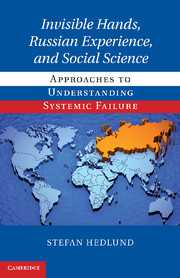 Invisible Hands, Russian Experience, and Social Science
Invisible Hands, Russian Experience, and Social Science Book contents
- Frontmatter
- Contents
- Preface
- Introduction
- 1 Opportunity and Self-Interest
- 2 Scope and Tradition of Social Science
- 3 Markets under Central Planning
- 4 Russia's Historical Legacy
- 5 Markets Everywhere
- 6 Institutional Choice
- 7 History Matters
- 8 Concluding Discussion
- 9 Implications for Social Science
- Bibliography
- Index
- References
9 - Implications for Social Science
Published online by Cambridge University Press: 01 June 2011
- Frontmatter
- Contents
- Preface
- Introduction
- 1 Opportunity and Self-Interest
- 2 Scope and Tradition of Social Science
- 3 Markets under Central Planning
- 4 Russia's Historical Legacy
- 5 Markets Everywhere
- 6 Institutional Choice
- 7 History Matters
- 8 Concluding Discussion
- 9 Implications for Social Science
- Bibliography
- Index
- References
Summary
In our introductory chapter, we cited Douglass North's apprehension over the growing trend of divergence within the family of social sciences. Noting that the “human environment is a human construct of rules, norms, conventions, and ways of doing things that define the framework of human interaction,” he deplored the division by social scientists of this environment into discrete disciplines. The problem was that the latter “artificial categories” do not coincide with the constructions that the human mind produces to make sense out of the human environment.
The reason this problem is so relevant to the present purpose is that many of the pressing problems of our time are located in an area where economics, sociology, and political science meet, and where at a now distant time in history they did have a common approach. Using a parallel from astronomy, one might even speak here of an expanding scholarly universe where over time a proliferating number of subdisciplines within the family of social science have increased their respective distances to neighboring disciplines, leaving behind in the middle an analytical no man's land. Whether this barren space really can be filled, or even bridged, by approaches from within new institutionalism still remains to be seen.
The following concluding account is divided into four sections. The first sums up and reflects on our understanding of financial crises, viewed as short-term systemic failures. The second digests what has been said about the causes and implications of path dependence, representing long-term systemic failures.
- Type
- Chapter
- Information
- Invisible Hands, Russian Experience, and Social ScienceApproaches to Understanding Systemic Failure, pp. 256 - 280Publisher: Cambridge University PressPrint publication year: 2011


